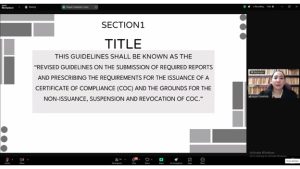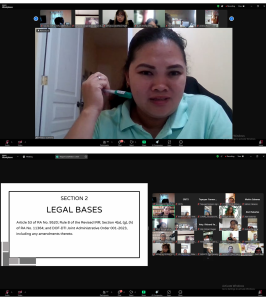To ensure cooperative stakeholders are well-versed in the latest regulatory standards, the Cooperative Development Authority (CDA) held an orientation today on Memorandum Circular 2025-02, titled “Revised Guidelines on the Submission of Required Reports and Prescribing the Requirements for the Issuance of a Certificate of Compliance (COC) and the Grounds for the Non-Issuance, Suspension and Revocation of COC.”
The event opened with welcome remarks from Regional Director Alberto A. Sabarias, who emphasized the importance of transparency, accountability, and timely compliance within the cooperative movement. He acknowledged the pivotal role of cooperatives in national development and highlighted how regulatory reforms such as MC 2025-02 are designed to streamline operations and uphold cooperative integrity.
The orientation proper was led by Ms. Raquel Castañeda, Senior Cooperatives Development Specialist from the Supervision and Examination Section, who provided a comprehensive overview of the revised guidelines. Her presentation covered key areas, including:
- Updated reporting requirements and formats;
- New timelines and submission protocols;
- Criteria for the issuance of the Certificate of Compliance (COC); and
- Grounds for non-issuance, suspension, or revocation of the COC.
Ms. Castañeda clarified frequently asked questions and engaged participants in a discussion to ensure a shared understanding of the provisions and their practical application.
In closing, Atty. Richard E. Ilagan, Acting Supervising CDS, delivered the ways forward and closing message, encouraging cooperatives to adopt proactive compliance measures. He stressed the importance of continuous education, internal policy alignment, and open communication with CDA to avoid administrative issues and foster cooperative sustainability.
This orientation reaffirmed CDA’s commitment to empowering cooperatives through clear policies, responsive guidance, and constructive partnerships—ensuring that they continue to operate with integrity and serve their communities effectively.












